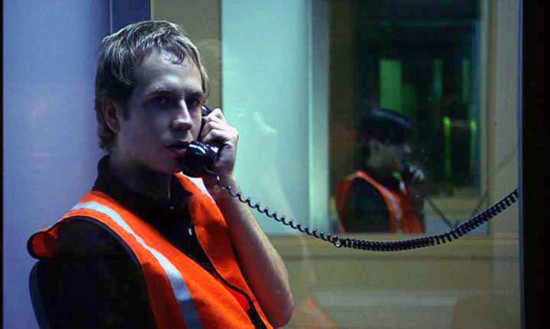FILM-FORWARD.COMReviews of Recent Independent, Foreign, & Documentary Films in Theaters and DVD/Home Video
Written & Directed by Gil Kofman Produced by Gil Kofman & Marika Van Adelsberg Director of Photography, Richard Rutkowski Edited by Curtiss Clayton Music by Ted Reichman USA. 95 min. Not Rated Released by Seventh Art Releasing With Mark Webber, Rachel Miner, Jerry Adler, Allan Rich & Peter Jacobson Can empathy get out of hand? French President Nicolas Sarkozy stirred controversy recently by proposing that fifth graders learn about the lives of specific children killed by the Nazis in the Holocaust, similar to how the U.S. Holocaust Memorial Museum in Washington, D.C. and the Museum of Tolerance in Los Angeles invite visitors to follow the fate of an individual as an educational tool. Highway toll taker Lukas (Mark Webber) follows a similar path in The Memory Thief, but literally through his life. Bland and sweetly innocuous, he has the most mundane and invisible of jobs, barely noticed even when he stops traffic to rescue a runaway dog on the highway. So he’s surprised that an elderly man (Allan Rich) angrily reacts to seeing him reading the copy of Hitler’s Mein Kampf he’d been handed by a passing motorist. When the same older man drives up to the tollbooth again, he flashes his Auschwitz tattooed numbers in Lukas’s face and insistently offers him a mysterious video. On the tape, Zvi Birnbaum has recorded his horrific Holocaust experiences: “I wish I could forget all this, but I can’t.” Soon Lukas can’t either. He seeks out more information through Zvi’s pretty med student niece, Mira (Rachel Miner), and her father (Jerry Adler), and insinuates into their lives, adopting their family history as his own. He also becomes obsessed with contacting film director Victor Horowitz, a thinly veiled satire of Steven Spielberg, who has moved from popular horror film entertainment to the serious horrors of The Selection. Lukas gets a part-time job transcribing and recording survivors’ testimony at a Holocaust archive, like Spielberg’s Survivors of the Shoah Visual History Foundation, even though his supervisor, Mr. Freeman (Peter Jacobson), warns of the emotional toll, but Lukas yearns for it: “I like being affected. It makes me feel responsible” – a response as ambiguous as how he avoids admitting he is not Jewish. Mira’s father dismisses Lukas’s interest as “a cheap man’s empathy,” but the young man resolutely takes on a more and more Zelig-like fantasy Jewish identity, like a recent bogus memoirist, gradually becoming a dark mirror image of the skinhead Jewish apostate in Henry Bean’s The Believer.
Webber is very effective in a Taxi Driver’s Travis Bickle-like transformation as Lukas loses touch with his own identity.
Even as it is gradually revealed that his bizarre behavior has been a pattern in his life, the extreme manifestation recalls the transmitted
posttraumatic stress disorder
reported by the children of survivors. Playwright Gil Kofman, in his feature film writing and directing debut, challenges head-on the universalization
of genocide sympathy as Lukas
repeats his mantra of “Auschwitz is not just for the Jews.” Kofman creates striking images as Lukas’s obsession multiplies, surrounded with walls of
Holocaust pictures and television sets simultaneously playing a cacophony of vivid testimonies of atrocities. (Kofman conducted and filmed the
seven survivor interviews). But the director questions the assumption that dredging up memories is catharsis for survivors, like his in-laws, who have been
able to get on with their lives, and their children; or the educational value of relating to victims, whether from Bosnia, Rwanda, or Darfur, when it
can vicariously feel like participating in one of those Asian extreme horror movies. In The Memory Thief, he has found a thoughtful, creative, and disturbing way to treat
the numbness of Holocaust fatigue.
Nora Lee Mandel
|
